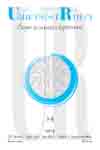Vjeroispovijest i jezik kao konstrukti identiteta u pismima Propagandinih misionara u XVII. i XVIII. stoljeću
Religion and Language as Constructs of Identity in the Letters of Propagation Missionaries in the 17th and 18th Century
Author(s): Divna Mrdeža AntoninaSubject(s): Literary Texts
Published by: Hrvatsko filološko društvo
Summary/Abstract: This article examines remarks and reflections on the identity of the community in epistolography and dedicational letters by some prominent Croatian religious ideologists and missionaries, as well as the effect which the spreading of Christian religions had on the development of the perception of the language, cultural and national/ethnic affiliation of Croats at the time just before the foundation of Congregatio de propaganda fide, in 1622. Reflections of the religious activists in their dedicational letters and epistolology have shown that there are explicated ideological constructs of the unity of Slavic languages in several varieties. First, there was an idea of a hybrid language based on the vernacular of Croatian and Bosnian language as composed by Stjepan Drenoci in the letter accompanying the diplomatic mission of A. Possevin in Russia; then, the standard consisting of different Croatian dialects which, with minor variants in the proposal, was suggested by Aleksandar Komulović and Matija Matulić Alberti. Second, a hybrid language consisting of Old Church Slavic and Russian, according to Levaković’s project, which was purified by Mate Karaman; third, a hybrid Old Slavic and Russian language as suggested by Juraj Križanić; fourth, taking one vernacular as a standard basis in two proposals; with Dubrovnik Štokavian as a basis, which was offered by Bartul Kašić, with a possibility of inserting some features of different dialects; then Bosnian vernacular, the lingua mater of all Slavic languages according to Stjepan Ružić of Dubrovnik. Despite a strong political interest towards the unification of the Catholics and the Orthodox in the fight against the Ottoman Turks, the prediction about one language which would help the unification of Slavic religions proved to be difficult to realize and the language as a component of similarity in identity, in the situation of creating different cultural and historical heritage, became a component of distinctive feature – the identity of vernaculars. It was actually tied more firmly to the religions also in the case of a unique diasystemic basis. As the material for building a language which should have been the tools for realizing a Christian unity, it gradually shaped itself into different language standards, whose standardization process is still under way..
Journal: Umjetnost riječi
- Issue Year: 2012
- Issue No: 3-4
- Page Range: 115-143
- Page Count: 29
- Language: Croatian

